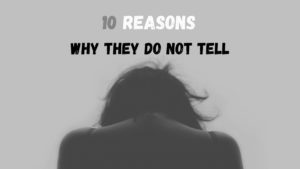Consent is essential in sexual intercourse. If one partner does not agree upon despite their relationship as boyfriend/girlfriend or spouse, it is still considered sexual assault.

While rape victims may say “No”, many feel silenced when thinking about disclosing the assault.
A study on violence against women and human trafficking,” conducted by the Ministry of Women’s Affairs and posted on Women’s Media Center of Cambodia website in April 2020, showed that rape cases have been reported less than the believed actual number of cases, finding it difficult to estimate how quickly the issue has spread.
According to Article 239 of Cambodia’s criminal code of conduct, rape refers to all acts of sexual penetration, of any kind whatsoever, regardless of sex, through violence, coercion, threat or surprise. The same article also states that rape is punishable by imprisonment for up to 30 years.
Why do rape victims not disclose their sexual assault?
Seng Reasy, an executive director of SILAKA, a non-governmental organization working on women’s empowerment and good governance, said in Cambodia’s society rape victims are afraid to disclose the crime for many reasons that include:
- Close Relation
Perpetrators of rape are not always strangers, but mainly family, relatives and people who are known to the family. It is difficult to close sexual assault cases as victims and their family find it hard to file a complaint, which would negatively affect the relative or friend. Sometimes surrounding people might exert pressure and criticism upon victims because the revelation would harm the relationship. - Shame and Victim blaming
Rape is viewed as shameful for victims and their families, which is an obstacle to justice. It is common for victims of sexual assault to feel ashamed and fear having their reputation ruined, especially women, as the majority of Cambodians think that victims losing their virginity is a disgrace to themself and family. Victims might also face scrutiny regarding their clothes, seductive behavior and judgement. As Cambodian culture values virginity over an individual’s humanity, it becomes a huge burden to women.
A study by the National Child Traumatic Stress Network (NCTSN), an American organization whose mission is to raise the standard of care and improve access to services for traumatized children, their families, and communities, indicated other reasons of not disclosing sexual assault include:
- Fear of not being believed
Consent from both sides is important for legal sexual intercourse. Victims of sexual assault can be straight or gay women or men, and they are afraid of not being believed about the assault as others might defend the perpetrator, or claim they do not have proof. - Fear of being blamed and punished by family
Reprisal and punishment from family and discriminaton from friends and surrounding people are barriers for victims reporting sexual assault cases. Despite being a rape victim, they might recieve critism and hatred from people. - Trauma
Feeling shocked, dazed, confused, and/or not remembering some details of the event can be traumatic responses to sexual assault. Victims are hesitant to speak up about the assault as they may fear of not being believed when they cannot 100% recall the event, or sometimes they do not want to talk or think about the painful event. - Depression
Rape is a nightmare stuck in the core memory of many victims. It also hurts their self confidence and value as a human being. Depression is a chronic illness, affecting well-being and daily life, and sometimes it can lead to suicidal thoughts due to somebody else’s cruel actions. - Limits in confidentiality
Victims of sexual assault might want to keep the problem confidential. They may believe that if they tell someone, and that person spreads the information, the authorities might become notified and involved, revealing the assault and their identity to the public. - Fear that nothing will be done
Loopholes within the legislative system, lack of support from surrounding people, and perceived injustice within society are key factors to victims’ unwillingness to disclose sexual assaults. Data from NCTSN indicates that fewer than 2% of reported incidents of sexual assault lead to the successful prosecution of the perpetrator. - Cultural or religious reasons
Cultural or religious beliefs might influence rape victims’ trust in law enforcement and how a family tackles a crisis, resulting in lack of desire to report a case. - Threats
The majority of victims of sexual assault recieve threats from perpetuators to not disclose the rape. The victims may be afraid of their work becoming affected, their own and family’s reputation becoming ruined, and threats against their lives.
Consent is essential in sexual intercourse. If one partner does not agree upon despite their relationship as boyfriend/girlfriend or spouse, it is still considered sexual assault.
If you encounter or know about a sexual assault case, you can notify local authories or contact the Ministry of Women’s Affairs via their Facebook page. Also, you can contact NGOs or civil societies for urgent intervention.
Reporting rape cases is the right thing to do in order to gradually resolve this societal issue, as it will benefit victims of sexual assault in terms of medical check ups, mental health consultation and legislative justice.



